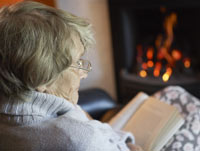
Older people believe their well-being is under attack through a combination of cuts to community services, poor care at home services and failings in hospital care, putting an overstretched NHS under even greater pressure, research from the WRVS released today shows.
The findings by the WRVS, which provides services to lonely and isolated people, show that the cuts are leading to the danger of increased isolation among older people increasing the risk of depression, which often leads to physical ill-health.
It found that many older people have concerns that some services and professionals – particularly health services – are falling far short of expectations due to cuts with delays among people being discharged from hospital now 12,433 above the level since the introduction of the public spending cuts. Cutting the number of older people admitted to hospital could save the health service £2bn a year.
The report forms the first part of the charity’s three-year Shaping Our Age project, which is a partnership between WRVS, the Centre for Citizen Participation at Brunel University and the Centre for Social Action at De Montfort University. The project aims to provide new ideas and insights to the emerging issues around ageing.
It is based on qualitative responses from 165 individuals from across the UK representing older people from all walks of life and examines older peoples’ views about the scope, quality, availability and importance of public services for older people.
It shows:
● Social interaction is one of the most important factors to improved well-being and quality of life, but older people are feeling more isolated as services become increasingly remote
● There is a tangible impact on older people, the wider community and the UK economy as a result of cuts to public services designed to prevent older people from being isolated.
● The level of practical support available to older people to enable them to continue living in their own home is not sufficient.
● There are significant failings in hospital care for older people – poor treatment from hospital staff, poor hospital hygiene and low disability awareness.
● There is evidence that unacceptable older people’s care is present throughout the public sector, which is sparking concern about the quality of public services more broadly.
David McCullough, WRVS chief executive said: “Overcoming loneliness and isolation is one of the most important aspects to maintaining or improving quality of life.
“It adds to the weight of evidence which shows that loneliness is a genuine health risk and if undetected, can lead to expensive and avoidable stays in hospital.
“Isolated older people are more vulnerable to returning to accident and emergency departments after a spell in hospital, are more likely to suffer from depression which in turn can lead to physical health problems.”
What do you think? Join the debate on CareSpace
Keep up to date with the latest developments in social care. Sign up to our daily and weekly emails
Related stories
Isolation can cause as much harm as physical illness in older people


 Bournemouth, Christchurch and Poole
Bournemouth, Christchurch and Poole  Hampshire County Council
Hampshire County Council  Lincolnshire County Council
Lincolnshire County Council  Norfolk County Council
Norfolk County Council  Northamptonshire Children’s Trust
Northamptonshire Children’s Trust  South Gloucestershire Council
South Gloucestershire Council  Wiltshire Council
Wiltshire Council  Wokingham Borough Council
Wokingham Borough Council  Children and young people with SEND are ‘valued and prioritised’ in Wiltshire, find inspectors
Children and young people with SEND are ‘valued and prioritised’ in Wiltshire, find inspectors  How specialist refugee teams benefit young people and social workers
How specialist refugee teams benefit young people and social workers  Podcast: returning to social work after becoming a first-time parent
Podcast: returning to social work after becoming a first-time parent  Podcast: would you work for an inadequate-rated service?
Podcast: would you work for an inadequate-rated service?  Family help: one local authority’s experience of the model
Family help: one local authority’s experience of the model  Workforce Insights – showcasing a selection of the sector’s top recruiters
Workforce Insights – showcasing a selection of the sector’s top recruiters 

 Facebook
Facebook X
X LinkedIn
LinkedIn Instagram
Instagram
Comments are closed.